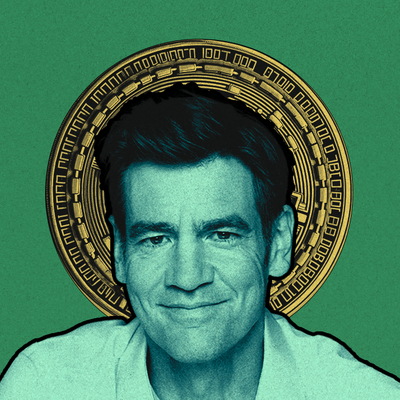
The Sunday Digest: Chipping Away
Everything we published this week + a chance to give us 1-on-1 feedback
March 19, 2021
Happy Sunday!
There's so much here: The name. The gold can (click the link to see that in all its glory). "Digital Hands." It might've been nice to find a sly, relevant way to address all this. We considered using this Digest intro to hop on the have NFT's Gone Too Far? train. We batted around the possibility of a crypto-chip-flavor-naming contest. We also thought about asking Pringles to sponsor the Digest (our caveat that subscribers each get a tube of CryptoCrisp was a dealbreaker, given the whole only 50 exist thing). But mostly, we just craved the shared experience of viewing CryptoCrisp together, in the absence of tasting it—although if you're one of those 50, please share, and do let us know how many Pringles cans' worth you paid.
Anyway. Before we get to our writing and everyone else's, there's another experience we want to share: a phone call with Dan Shipper. Specifically, a phone call between Dan and any Means of Creation subscriber. We want some feedback on the newsletter and the show—What do you like? What do you want more of? What should we change? To schedule time for your 1-on-1, hit the link below...and give the Digest a look while you're at it, won't you?
What We Published
This week’s output: 6 articles + 3 podcasts
📝 ARTICLES 📝
The Founder Trap
by Nat Eliason in Almanack
Founders spend a lot of time running through reams of ideas, concepts and strategies, all in search of the right one. But when you spend enough time trying to make things work, it's easy to stop thinking about what might happen if you actually succeed. Starting your business small is a good way to generate a diversity of ideas, but it doesn't always lend you the scope of vision necessary to navigate growth. In this short but salient piece, Nat asks important questions about responsibility, flexibility, and looking into the future.
Read (2 minutes)
Paranoid Productivity & Inner Limits
by Frank Anaya & Christina Luo in Praxis
This week marked the Every debut of the Praxis Fellows, a cohort of thinkers and writers from Tiago Forte's Building a Second Brain course. "Paranoid Productivity" focuses on the human tendency to wind ourselves up as a way into being productive—and how we might change that relationship. "Inner Limits" applies Tiago's note-taking approach to journaling practice. Christina and Frank have both delivered rich, readable essays exploring new corners of productivity. We're thrilled to have them on Every.
Read Paranoid Productivity & Inner Limits (13 minutes)
Action Item: How to See the Future
by Dan Shipper & Annaliese Griffin in Superorganizers
This actionable excerpt from Dan's conversation with Geoffrey Litt zeroes in the MIT software engineer's research process. Litt's approach has a lot to do with setting aside time—be it for deep work, reading, or sketching out his materials on a digital notebook app. This is the foundation of his work towards theorizing and realizing computer science's future—which, as Dan writes, requires "time and space to properly develop." Looking ahead is a smoother process when done with patience. Here's a map to getting to that point.
Read (5 minutes)
Is Substack a Platform or a Publisher?
by Nathan Baschez, Li Jin & Turner Novak in Means of Creation
With Nathan back in the fold, the MOC news roundup continued its special-guest streak, with Turner Novak hopping in to make sense of this week's creator news, including Substack's shift into publisher territory, Clubhouse's creator acceleration program—and Li's first NFT sale!
Read (9 minutes)
🎧 PODCASTS 🎧
#63 - Creative obsession: a gift and a curse & #64 - Do you respect me?
Talk Therapy with Dan Shipper & Nathan Baschez
What are we afraid of? That was the uniting question of this week's Talk Therapy installments. On Wednesday, Dan and Nathan broke down sensations they share experience with: deciding what to do with inspiration, and figuring out how to crest the hill of having none. On Friday, they went in a different direction: identifying their individual stumbles as cofounders, they asked each other how to accept your own shortcomings without losing self-respect. It made for one of the most honest and emotional episodes in memory. Don't miss it.
Listen to #62 (21 minutes) & #63 (19 minutes)
#14 - What, Me Worry? Workshopping Dan Shipper
The Long Conversation with Rachel Jepsen
Some of the best installments in our favorite writing-centered podcast have taken the form of workshops, where Rachel breaks down an upcoming Every piece with its writer and other members of the collective. Last week, she and Taylor Majewski spoke with Dan about his writing on the topic of worry. Diving into metacognitive theory as they exchange their own experiences with worry, the panelists perform the best kind of workshop: one that benefits the piece's writer and readers equally.
Listen (39 minutes)
What’s Going On
News you might have caught or missed this week.
Did Substack explain itself enough?
A week ago, in a blog post entitled "Why We Pay Writers," Substack founder Hamish McKenzie ran through the platform's short history monetary relationships with writers, from taking a cut of their subscription earnings to fronting them advances. The essay ultimately sought to explain the thinking and organization behind the Substack Pro program, which started as a way of ensuring writers got "paid for a year of work no matter how their publication performed." But over the past week, many readers and writers have asked a subsequent question: who, exactly, is getting Substack money? Some feel the program's secrecy (Substack Pros can self-identify, but the company won't release the full roster) is a way to protect elitist leanings; others see Substack edging toward publisher territory; and those with an eye on the industry think both problems open the company up to fiercer competition. With the number of newsletter ventures cropping up on a daily basis, don't expect Substack to be the only platform who has to answer these questions.
More News
- Facebook explores paid deals for new publishing platform
- MrBeast’s management company has a new venture fund backed by creators
- A.I.’s Most Important Dataset Gets a Privacy Overhaul, a Decade Too Late
What We’re Reading
Our favorite writing from beyond Every
Faces of Histories
How many classic works of art have you seen animated into action this year? If the answer isn't "none," it's at least probably "more than usual." That's largely thanks to the new machine-learning program Deep Nostalgia, which has gone viral over the past month as millions of people have used it to put centuries-old paintings and baby pictures alike into motion. At Real Life, Nehal El-Hadi wrote about the phenomenon, identifying how the invention is deeply of its time for reasons outside of technological advances: "Kept away from those we love," she writes, "this technology returns a sense of control by allowing us to imagine and re-create the moments we were denied." El-Hadi's hopes and worries for and about Deep Nostalgia largely have to do with accessibility: "The implications of technology aren’t distributed evenly," she asserts, "and if these concerns aren’t confronted and addressed now, the inevitable evolution of machine-learning technologies like Deep Nostalgia will distribute those uneven effects exponentially."
More Reads
- You’re Doing It Wrong: Notes on Criticism and Technology Hype (Lee Vinsel)
- The Pastry A.I. that Learned to Fight Cancer (The New Yorker)
Tweet of the Week
🎊A 4 + four zeroes for Packy!🎊
An Invitation to Every
Not a subscriber? Intrigued by the bundle? Now would be a good time to subscribe — you can try a trial for just $1.
Find Out What
Comes Next in Tech.
Start your free trial.
New ideas to help you build the future—in your inbox, every day. Trusted by over 75,000 readers.
SubscribeAlready have an account? Sign in
What's included?
-
Unlimited access to our daily essays by Dan Shipper, Evan Armstrong, and a roster of the best tech writers on the internet
-
Full access to an archive of hundreds of in-depth articles
-
-
Priority access and subscriber-only discounts to courses, events, and more
-
Ad-free experience
-
Access to our Discord community








Comments
Don't have an account? Sign up!